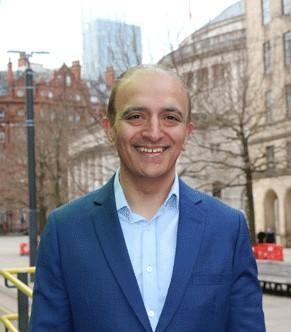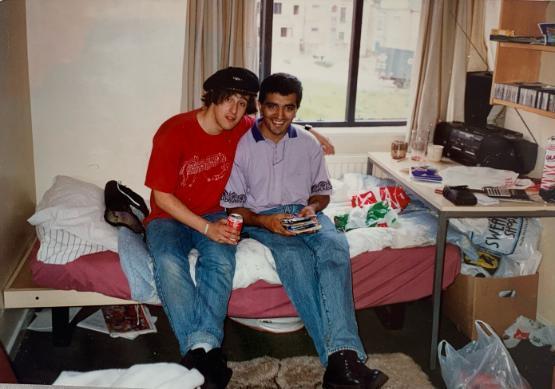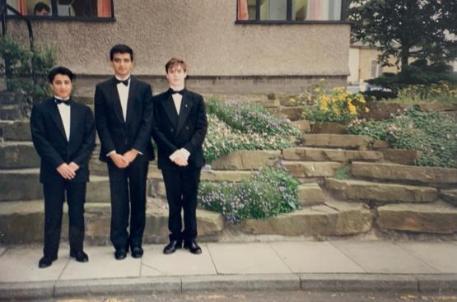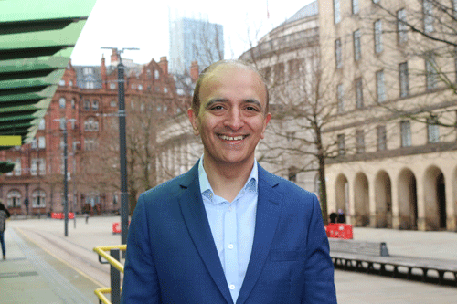Q&A with Asif Ghafoor
Asif Ghafoor completed his degree in Business Studies in 1992 at the University of Bradford. Following his time at university, Asif has held many senior roles including Managing Director for Amey Investments, and Non-Executive Director at Wandle.
He is currently the CEO of Be.EV, the largest electric vehicle charging network across Greater Manchester, and Co-Founder of Iduna, which develops new infrastructure in the mobility, telecommunications, and energy sectors.
Asif supports the University as a regular donor toward the Bradford Futures Fund, supporting students facing the most challenges in accessing and remaining in higher education.

Asif Ghafoor
Why did you choose to come and study at the University of Bradford?
Back in 1989, not many students were doing mixed skills courses. A sixth-former like me would choose History or Economics or Mathematics - but not Business Studies! I chose Bradford because the business school had a good record and a very interesting course. I didn’t know what I wanted to do for the rest of my life, and this gave me three years to learn more skills, and experience some potential internships to help me decide.
From an academic perspective the course was super-interesting, and I was good at it and enjoyed it. I met so many different types of people and Bradford had a good mix - even back in 1989 - of mature students and fresh undergraduates. This mix of people and experiences created a good balance of attitudes. Outside of academia I made lots of friends and we enjoyed the very cheap activities the University and its neighbours offered. Back in those days the government gave you a grant and I even managed to save some money from mine!

Asif and a friend at University halls in the early 90's.
How did your career progress after graduating?
When I came to university, I didn’t know what I wanted to do, and I noticed that those students whose parents were in professional jobs were helping to guide their careers. My parents pushed us to be happy and successful but didn’t have the contacts to arrange internships or work experience. At school I was lucky to shadow a judge for two weeks which, to be honest, put me off law – it wasn’t as interesting as it was on the TV!
The Bradford Careers Team suggested to me at the end of my second year that I should apply for an internship with Midland Bank (now HSBC). They had a programme offering ethnic minorities an eight-week internship, which gave a window into the career of a banker on their graduate programme. That little push from the University changed my life. The internship opened my eyes to banking, which parts I liked and which parts I didn’t like, and I made some contacts in the bank who became my mentors beyond the eight-week programme. This led me to apply for jobs in City of London banks. In 1992, it was tough to get a graduate role, but I managed to get a few offers and selected NatWest Markets. The University played a critical role at the right time to put me on my future career path, and I will be eternally grateful for this.
I stayed in banking for five years, focussing on aircraft financing, and then joined BAE Systems in their treasury team. In 2006 I moved on to Amey plc, ending up on their Executive Committee as the Managing Director of the Investments Division.
You are a donor towards the Bradford Futures Fund Scholarships – what motivated you to become a supporter?
Being given the chance to attend such an amazing university, receive an education, and be in a place which opens up opportunities should be available to as many people as possible. Malcolm X said “Education is the passport to the future, for tomorrow belongs to those who prepare for it today.” His words speak volumes to my experience and why playing my small part in this way is so important to me.
I have been lucky that at different stages in my education I was supported by scholarships, which made it easier to obtain my education, so I know first-hand the impact a scholarship can have.

Asif and some classmates heading to the summer ball at the business school in the early 90's.
What do you hope the impact will be on the recipients of these scholarships?
I want the recipients of these scholarships to be successful not only in achieving their degrees but in everything else that this University can offer them. As a child of immigrants, you don’t have the opportunities to meet as many parts of our society, but the University of Bradford careers team gave me an opportunity beyond education. As mentioned, in my final year of my undergraduate degree I was offered a chance to go on an internship with Midland Bank to see all aspects of their two-year graduate programme in an eight-week period, which set me up for a successful career. Opportunities like this provided by the University are vital for building life and career skills, and I hope the recipients of the scholarship are as lucky as me.
How did your current role as CEO of Iduna and Be.EV come about?
I have spent over 25 years developing infrastructure in the UK. About seven years ago I got very interested in the ways that technology would disrupt traditional infrastructure systems – including the petrol station facilities that combustion engine vehicles rely on - what the impact of data would be, and the urgent need operate more sustainably. Large organisations are like oil tankers, and I could envisage some of the Silicon Valley tech operators easily dominating infrastructure and how it is delivered within the next 10 years. My response was to set up Iduna, which seeks to develop businesses in this space off the back of these disruptive factors. We entered into our first business in electric vehicle charging by being awarded a framework contract with Transport for Greater Manchester, and from there we have developed an EV charging business in the North of England.
What have been the major challenges that have come with setting up a new company in an emerging industry?
There is a lot of mis-selling of hardware and chargers going on – equipment that is either the wrong type, or has no support so breaks and is never fixed. This disappoints me, and I wanted to build a business which only provides and maintains an operating network of working chargers. That’s our focus. To do that, we use data and analytics – in the right way – to drive the business forward and give our users a simple and effortless experience.
The biggest challenge for us at the moment is to find land for new charging sites at the rate that is needed to stay ahead of demand. We want to expand the network really quickly to give people across the North the confidence to switch to electric vehicles. Finding new sites has been harder, because the market is new. We have a good pipeline of new sites at the moment, but we could do more and go faster.
This is an emerging sector and very interesting – there are few jobs where you can make a difference like you can in EV charging right now.

Asif Ghafoor, BSc Business Studies 1992
What do you want to achieve with Be.EV – what do you think the future of the company and the industry will be?
We want to build a network in the regions we operate in that offers plenty of working chargers where people need them – at destinations like gyms, shops, and workplaces – as well as just outside your doorstep in local hubs. That’s what will give people the confidence to move from a combustion engine vehicle to an EV, which will help us towards net zero goals and improve the air we breathe. It’s also a once-in-a-lifetime chance to radically improve neighbourhoods, by installing a charging infrastructure that doesn’t look like a petrol station, but like a green oasis – a small park, where you can relax in an interesting environment while you charge.
The EV industry now is like the early days of the internet or the tech sector. For current students or graduates looking to work in this industry, I think that getting involved via internships at the beginning will prove very rewarding because you can help shape how this sector develops. Today it’s EV charging, tomorrow it’ll be cleaner energy or better communications – these areas are all related, so you won’t have a narrow career but one which is varied and drives the next industrial revolution
